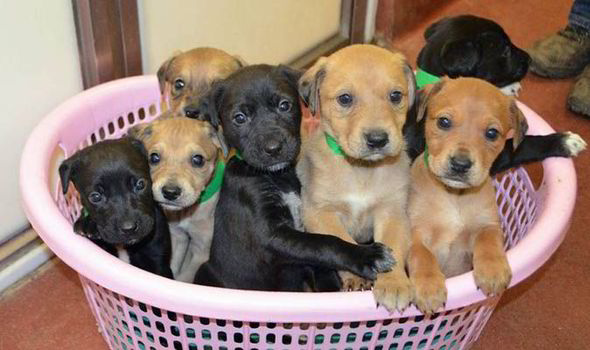Deciding where to get your puppy can be a major decision. There are so many different options to choose from. Your local animal shelter, rescue groups and humane societies, professional and back yard breeders, (back yard breeders are usually individuals advertising in the local newspaper-Buyer Beware!) pet stores and online sites.

Animal Shelters & Humane Societies-Dogs of any age, from puppies to seniors, AKC standard breeds and mixed breeds can all be found at animal shelters. Many of these dogs have been abandoned, abused, lost or surrendered. Many of the dogs are in animal shelters due to behavioral problems or owner irresponsibility. Sometimes people surrender their pet because of behavioral issues such as jumping, barking, running away, aggression, etc. all of which can, more than likely, be transformed with the right, caring owner and some formal obedience training. Not all dogs end up in shelters due to behavior problems. Many are in need of re homing for reasons that have nothing to do with their behavior. Sometimes owners move away and cannot take their pets with them. Personally, I wouldn’t move there, but that’s just me! Some landlords do not allow renters to have pets because of past misfortunes with irresponsible owners. Some owners simply can’t afford to care for their pet, and other owners are just too busy.
All reputable animal shelters vaccinate pets against disease and treat for external parasites, worms, heartworm and kennel cough. (Bordatella) Most organizations will spay and neuter the pet before re-homing and will temperament and behavior test the dogs. This testing allows the organization to tell you about the pets personality traits and what type of home and owner would best suit them.
Shelter puppies may be excitable or very relaxed. It depends on how much socialization, training and interaction the pups have had early in their life. Mixed breed dogs are less likely to have health problems that effect pure breeds. Some health problems can result in inbreeding and can include orthopedic, eye or behavioral issues, to name a few.
There are many reasons to adopt a puppy from an animal shelter. Many are kill shelters who are only able to keep dogs for a short period of time before they are euthanized due to overcrowding. You will save a life by giving them a home! Most shelters will ask for a small donation when you adopt. Your money will allow the shelter to buy food and supplies for ongoing care. Adopting from shelters will help minimize puppies being purchased from puppy mills and pet owners who breed just for money with disregard to the breeding dogs overall health and temperament. When people stop buying from them they will stop breeding. You will be able to tell other individuals about the wonderful dog you adopted, how happy it made you feel to save a life and will help dispel some of the incorrect myths about adopting dogs from shelters. You can locate animal shelters by searching online, your local telephone directory or asking at your local pet store.
Rescue Groups-If you have your heart set on a particular breed, you can contact rescue organizations for that particular breed. Many specialize in pure breeds and will have puppies available as well a adult dogs. Most groups have adoptions on a regular basis at pet stores. Many of these groups will carefully screen individuals who are looking to adopt by performing in house inspections (for example making sure you have a fenced yard , where it will live, and how you will take care of it) and will ask for personal as well as veterinarian references. They may also require you to sign a written contract stating that if you decide you and your new pet are not a good fit, that you will return the pet to their organization. Many of these organizations also foster animals so if they do not have the particular type of dog you are looking for, they may locate your breed in one of their foster homes.
Breeders-Breeders specialize in purebred puppies and should be able to tell you about the dogs background, it’s breed and temperament and the size of it’s parents.
Look for a breeder who not only breeds for looks but for temperament and personality. This means they aren’t just concerned with how the puppy’s look conforms to breed standard, but also how each puppy acts. Good breeders will start to socialize the pups early, helping them become accustomed to human handling and will expose the pups to different sights and sounds. Breeders that line breed (known as breeding for show) produce show dogs for competition and focus on producing a litter to meet breed standards. For them it’s sometimes more about appearance than temperament.
Health problems from over breeding can be an issue with pure breeds. Although the better breeders will take steps to prevent inherited conditions, purebreds may be predisposed to a range of hereditary and congenital diseases.
A legitimate breeder should provide a sales contract with the dog’s name and registration number, AKC preferred, a litter number, it’s parents name and registration number, it’s date of birth and sex, and an explanation of any guarantees and agreements such as neutering requirements, and the signature of both buyer and seller. They should supply a record of vaccinations, worming and veterinary exams.
How to Identify a Reputable Breeder-Once you have contacted a breeder, you need to determine if they care about the breed and to whom they sell their dogs. Here are a list of questions to ask
1.) Are the sire and dam both over two years old? Both the sire and dam should be at least 2 years of age or older and have the proper health clearances for that particular breed. Having these certifications helps limit the chance that your puppy may develop one of the genetic health issues.
2.) Do both the sire and dam have health clearances and has the breeder given you copies?
3.) Do the sire and dam have titles in conformation, obedience, agility, herding, tracking, Schutzhund or any other activities?
4.) Does the breeder know the breed well? They should know about the health and temperament problems that exist in the breed. An experienced breeder will know how to recognize certain traits in individual puppies that will help match them to the right home. You will pay substantially more for a pure bred dog but you can see why.
Pet Stores-Buyer Beware! Regardless of how cute and loving that puppy looks in the window, do not be tempted. Doing so supports puppy farms and mills. They are medium to large scale dog breeding enterprises that supply most pet shops. They are like a factory, with puppies being the product on an assembly line. Profit is primary, the welfare and breeding of the puppies is secondary.
Puppies raised in this environment may suffer from inherited or acquired problems. The dogs are usually bred too often, with no concern for genetic defects or the health of the parents or litter. Breeding conditions are typically not clean or humane, and the puppies are removed from their mother too early so they can be sold. Puppies should stay with their mother until they are 8 weeks old. All of this can result in puppies with physical or emotional problems. They may also suffer from Early Stress Syndrome (ESS) which can result in aggression. Puppies that are unsellable may be discarded. It’s a horrible situation and completely understandable why you would want to bring the puppy home to save them from this horrible fate. Unfortunately, that just encourages the cruel practice of farming puppies and puts even more dogs at risk.
Online Sites-Craig’s List-I have personally seen many pets purchased from individuals online. Every dog I have seen purchased from this site in particular has had serious health or aggression issues. Most, not all owners, are looking to re home the dog because of health or behavioral issues regardless of what they claim the reason to be. I suggest asking for a written contract that if the dog does not work out for some reason that the owner take the dog back, pay medical expenses when necessary and refund your money partially or in full.
Back Yard or Novice Breeders-These individuals usually advertise in the local newspaper. They own a pet that they think is cute so they decide to breed it to get an extra buck. They are completely ignorant of breed standard or temperament. They do not know the pedigree of the dog, do no testing for genetic defects and rarely have a record of vaccinations, worming and veterinary visits. These dogs are usually CKC registered because CKC will register anything for $. Typical price range depending on where you alive in the country is $200.00 to $500.00.
Copyright © All That Dog



